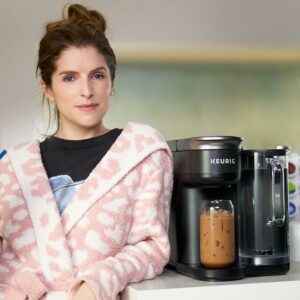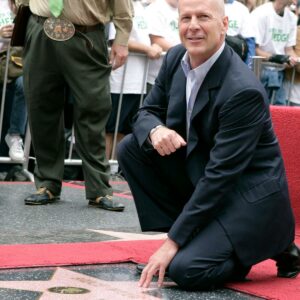In the late 1980s, when hip-hop was finding its stride, a young woman from Newark, New Jersey, was quietly—yet powerfully—redefining the genre. Queen Latifah, born Dana Owens, wasn’t just entering hip-hop; she was shaping it, bringing forth a perspective that was rarely heard at the time. She was an artist who understood the power of voice, rhythm, and self-expression, and she believed that her art could transcend the constraints typically placed on women in hip-hop. Queen Latifah’s rap journey began with something deceptively simple: daily practice in the quiet solitude of her bathroom. In this unconventional space, she honed her skills, fostered her creativity, and found her place in the world of hip-hop.
Discovering Her Voice: Queen Latifah’s Early Passion for Rap
Long before the fame, Grammy awards, and Hollywood accolades, Queen Latifah was just a young girl passionate about music. Her childhood home was filled with sounds that spanned genres, from jazz and blues to soul and, increasingly, hip-hop. She found herself drawn to the genre’s raw energy and its unique ability to convey stories, messages, and emotions. Rap, with its intricate wordplay and rhythmic flow, captured her attention in a way nothing else could. For Latifah, it wasn’t just about rhyming words; it was a medium to channel her emotions, her thoughts, and her identity.
In her early teenage years, she began exploring her talent, writing rhymes and experimenting with rhythm. However, finding a place to practice without interruption proved challenging. She needed a sanctuary, a place where she could immerse herself fully, away from distractions. Her solution? The bathroom. Its unlikely role in her journey might sound curious, but to her, it was the ideal rehearsal space—a place that afforded her the solitude and acoustics to perfect her craft.
The Bathroom as a Creative Space
It’s easy to overlook the bathroom as a creative haven, but for Queen Latifah, it became the birthplace of her talent. Bathrooms, with their reflective tiles and tight spaces, often create a natural echo effect that enhances vocal projection. For Latifah, this echo gave her an early appreciation for acoustics and helped her become comfortable with her voice. When she rapped in that small, tiled room, her voice felt bigger, bolder, and more powerful. In those moments, she could feel her words reverberating through the air, allowing her to test her vocal strength and experiment with intonation.
Beyond the echo, the bathroom offered something even more vital: privacy. For a young woman pursuing an art form as intense and public as rap, privacy was crucial. She needed a space where she could shed her inhibitions, where she could stumble over lyrics without feeling judged, and where she could explore the full potential of her voice without restraint. The bathroom was her sanctuary. There, she could be loud, assertive, and completely herself—qualities that would later define her music.
Building Confidence and Skill Through Practice
Queen Latifah’s bathroom rehearsals were more than just a practice routine; they were a discipline. She committed to daily sessions, refining her lyrics, working on her rhythm, and experimenting with new flows. Her dedication was unwavering, and as the days turned into months, she could feel herself growing as an artist. Each session was a small step towards building her confidence, each verse a brick in the foundation of her musical identity. The hours she spent alone, rapping to the beat of her own voice, laid the groundwork for the performer the world would come to know.
In interviews, Latifah has often attributed her early success to the discipline she cultivated during these formative years. It’s easy to overlook the importance of routine in creative endeavors, but for Latifah, daily practice was essential. The bathroom was not just a room in her home; it was a training ground. Every time she closed that door and faced the mirror, she wasn’t just a teenager in a bathroom—she was a rapper preparing to conquer a stage, to defy expectations, and to redefine what it meant to be a woman in hip-hop.
Redefining Rap as a Form of Expression for Women
Rap has long been a male-dominated genre, and for a young woman like Queen Latifah, breaking into the industry came with its own set of challenges. Her lyrics were assertive, unapologetic, and spoke to the struggles and triumphs of women—a perspective that was sorely lacking in mainstream hip-hop at the time. Latifah’s bathroom rehearsals were, in many ways, a rebellion against the norms. She was proving that a woman’s voice could be just as powerful, if not more so, than her male counterparts.
When she finally stepped out of her bathroom and onto the stage, Latifah brought with her a unique perspective that resonated with women across the country. She wasn’t just a rapper; she was a trailblazer, a voice for empowerment, resilience, and strength. Her music wasn’t about conforming to the existing narratives in hip-hop; it was about creating new ones. Songs like “Ladies First” and “U.N.I.T.Y.” weren’t just hits; they were anthems of empowerment, proof that rap could be a vehicle for change and that women had a place in its narrative.
Her lyrics spoke to issues that were often ignored in hip-hop: respect, equality, and self-worth. She used her music to challenge stereotypes and to encourage other women to find their voices. The bathroom sessions, which had once been a private ritual, became the foundation for a public mission. Queen Latifah showed the world that women in hip-hop could be powerful, eloquent, and unstoppable.
Reflecting on Her Roots
Looking back, Queen Latifah often speaks with fondness about those early days, about the hours she spent perfecting her craft in her unconventional rehearsal space. For her, the bathroom is more than just a room in her childhood home; it’s a symbol of resilience, determination, and humble beginnings. She recalls those days with a mix of nostalgia and gratitude, recognizing that they were crucial to shaping her identity as an artist.
In interviews, Latifah has expressed her belief that great art can come from anywhere—that a young artist doesn’t need a fancy studio or expensive equipment to hone their talent. Sometimes, all it takes is a small, echo-filled room and an unrelenting drive to improve. Her story is a reminder to young artists everywhere that greatness often begins in the most unassuming places. The bathroom was not a limitation; it was a launchpad, a space that allowed her to find and define her voice.
Queen Latifah’s Advice for Aspiring Artists
Today, as a celebrated figure in both music and Hollywood, Queen Latifah remains an inspiration to aspiring artists. Her journey from bathroom rehearsals to hip-hop royalty is a testament to the power of self-belief and dedication. Her advice to young artists is simple yet profound: find your voice, hone it, and never be afraid to embrace your unique path—even if it begins in an unexpected place.
For Latifah, success was never about following someone else’s footsteps; it was about creating her own. She encourages aspiring rappers, especially young women, to embrace their individuality, to practice tirelessly, and to believe in their potential. “Don’t worry about where you start,” she often says. “Focus on where you’re going. And remember, your voice is your power.”
In the end, Queen Latifah’s rap journey is a story of empowerment, resilience, and self-discovery. She transformed a small bathroom into a stage, a rehearsal space, and ultimately, a place where she discovered her identity as an artist. Her journey reminds us that true artistry doesn’t come from the environment around us—it comes from within. And sometimes, all you need is a quiet room and a fierce determination to make your voice heard.





